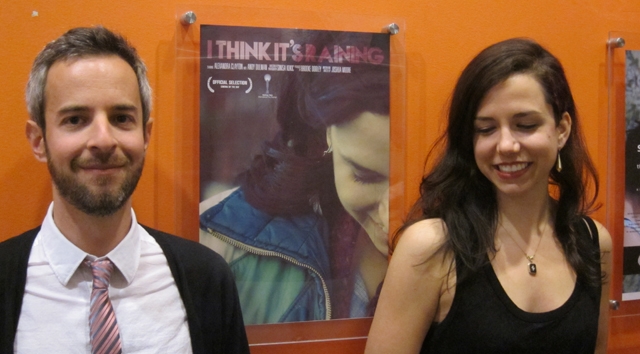I Think It’s Raining
‘Raining’ a prodigious exercise in self-discovery, one step at a time
by Tyler Dean
Film Break | Official Movie Site
What does it mean to be alive? A question we hardly consider as we go about our day-to-day but were we asked it’s likely one would respond with answers like “growth”, or the more specific “to get through each day as it comes.” After seeing I Think It’s Raining, I would offer that to be alive is to establish your existence in this world; a memory of your being; through the relationships we have with one another. In Joshua Moore’s neo-New Wave feature debut, life – and its oftentimes aimless meandering – becomes the subject of one young woman over the course of a weekend as she searches the cityscape for a purpose in life which has thus far eluded her. But as the story unfolds, even from the get-go, it begs us to ask ourselves: who is running from whom?
Renata, a bewitching, troubled twenty-something and talented musician, returns to San Francisco after a lengthy leave of absence. Never are we told the exact reason she’s come back or even the reason why she left in the first place. Instead, we’re thrown into the middle of an expletive-laden conversation taking place on the front stoops of a house between our “protagonist” and a toddler. A moment of comedy to be sure, yet we immediately come to see Renata as someone who is not only brazen but brazenly conscientious of her existence as wholly devoid of pragmatism and paradigmatic assertions. She walks, bikes, and hitches bus rides along the Bay Area city streets, a quasi-Alighieri odyssey over the course of one weekend. Unobstructed and without impedance, her search becomes one of a freedom which we not only rule out as deceptively oblique but marred by the fact that the acknowledgment of existence, especially hers, is one of illusive plasticity.
In one particular scene, Renata enters a bar which we come to find has been appropriated this evening for a friend’s birthday. She tries to play catch-up with friends and young men that claim to know her from “somewhere”, but the music—music of a foreboding past, and perhaps an even more portentous future—drowns out any chance of her being drawn back into their world. Indeed, it isn’t long into these anonymous encounters that she succumbs to a panic attack and disappears into a bathroom stall where she attempts to gather herself with the help of medication. Trapped in this purgatory of misty-eyed, inebriated ghosts, Renata allows herself to melt into an obfuscated present that she is somehow no longer privy to. At one point during the party she is called up on the stage to sing a song (“The Knowing Streets”), during which visuals by Moore show Clayton’s face superimposed with footage of paved roads and pedestrian traffic which help to further convey a motif of prodigality.
While watching I Think It’s Raining, it is extremely difficult not to feel yourself being drawn in to the life of this young woman—a physical embodiment of memory whom we project our own experiences onto. A refreshing character of disquieting mirth who doesn’t give two shits about what you had for lunch that day, we’re torn between enduring the compulsion of seeking out the comfort, company, and solace of Renata’s piquancy, and knowing it would all be for naught because we get the feeling she would push us away in the end. So when Renata comes across a young man named Val (Andy Dulman) about halfway through the film, one can’t help but feel a sort of inward sigh at the inevitable reparations to be made. But Moore surprises us here. He doesn’t use the tell-tale signs of auspicious and burgeoning young love to change Renata’s demeanor, but instead to magnify it in a way that exposes a different, untapped side of her. A promising deviation from the more homogeneous (albeit, mature) cinema of late, Moore uses the opportunity to send a message: how much do we really know about someone until we’ve walked in his or her shoes? It is a question which has clearly haunted Moore for some time, who says he based the film’s events and characters on an actual past relationship he was once in.
Although I Think It’s Raining is the San Francisco-based writer/director’s first feature-length film, there’s no way you’d be able to tell. Borrowing heavily the stylistic conventions of the “Nouvelle Vague” (specifically filmmakers Jean-Luc Godard and the Left Bank’s Agnès Varda) Moore cements further the concrete realness of Renata and her search for grounding in this world by taking a very “run-and-gun” approach. The French New Wave was known for its raw, documentary-like realism when it came to making films, and the influence here is obvious. The style was demarcated by handheld cameras, nonprofessional actors, natural lighting and sets, and a story which is meant to convey a “slice of life” in the characters on-screen. If a filmmaker has done his or her job correctly, then (s)he will have concocted a sort of balancing act whereby the obvious lacking in fluidity of any one area has been smoothed out to a point hardly noticeable by those in the audience.
It is with this in mind that I was struck by how at odds I felt about the actors’ ability in conjunction to the film’s style and narrative. Undoubtedly a by-product of the director’s decided dismissal of maintaining strict coherence of his script, throughout the narrative Renata and Val carry on Linklater-esque conversations in an awkward, pause-filled manner that initially induces a sort of ticking time-bomb dread. That said, where I Think It’s Raining is different from past films is that Moore maintains a consistency that continues to draw you in the entire time: life itself is filled with awkward conversations, with real people who don’t always know what to say, or say the wrong things at the wrong time. With the help of handheld camera techniques that connote a sense of “there-ness”, the realism of Raining, a period piece set in the course of our everyday lives, is compounded into an experience that doesn’t attack our retinas but obliterates the fine line between vicarious onlooker and colluding arbiter.
Even as the film ends, the ambiguity stays consistent: Renata, now wandering inside her home instead of arguing with toddlers on its front stoops, graduates from the “to-look” prerogative of Varda’s Cléo de 5 à 7 to a cathartic and blunt examination of inner existentialist angst. She wades through a disheveled array of clothing, enters and exits closets pock-marked with pencil etchings of a life in review, and, in a sort of longing gesture for the individual she used to be (and who we suspect we haven’t yet met), traces a pair of initials carved into the wooden fence in the backyard. As the screen cuts to black we can’t help but wonder what will become of Renata. Will she continue to repudiate the lives of others, all while in search of an emergency exit into the inky black oblivion, or will she finally realize that even an empty glass left out overnight will quench the most desperate of thirsts after a thunderstorm? My money’s on the latter.
You can find and watch I Think It’s Raining on Amazon Instant and YouTube for a nominal fee. The film can also be found on your Video-on-demand service.
The complete soundtrack for the film can also be found on Amazon.
FilmBreak, the distribution company behind I Think It’s Raining, is a data-driven marketing platform connecting film fans with filmmakers. Their company is set up to help filmmakers actively build, engage and identify the taste profiles of their online audience while simultaneously giving fans access to exclusive film content.
(ATOD Magazine EDITOR, Dawn Garcia: Thank you Darren Marble.)






